Your basket is empty

How to Care for Your Dog in Cold Weather
October 25, 2022 8 min read
The winter seasons can be unpleasant for humans, but they can be downright dangerous to dogs unless you know the risks and safety measures you need to take as a pet owner.
While weather conditions in the United Kingdom aren’t usually too severe around autumn and winter, it never hurts to be prepared. Besides, if you ever need to travel to another country with a cooler climate, you’ll know how to keep your dog safe.
Low temperatures can lead to hypothermia and frostbite and worsen the symptoms of arthritis in dogs. In addition, snow, ice, or road grit can get caught between your pup’s paws and cause pain and inflammation.
There are other hazards associated with chilly conditions but don’t worry; we’ll cover all of these in this guide so you know how to care for your dog in cold weather.
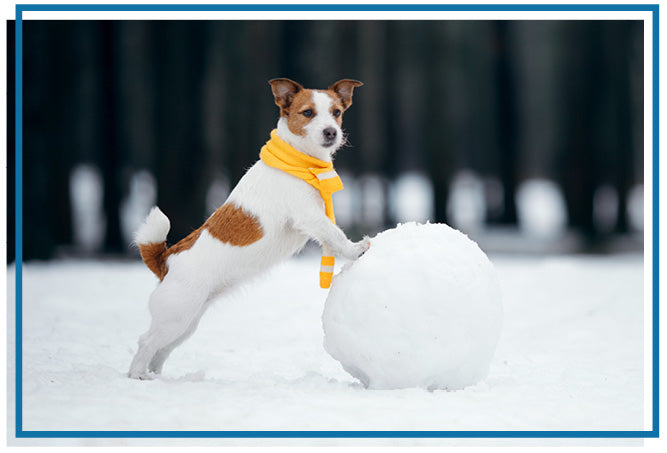
***
Winter Health Risks
As the evenings get colder and darker, your dog is at a higher risk of certain health issues, which we’ll be going over below.
Hypothermia
Cool conditions and icy winds can cause your dog’s body temperature to drop. In severe cases, it can lead to hypothermia. Dogs develop hypothermia when their body temperature drops below 37°C (a healthy range is between 38 to 39.2°C).
A hypothermic dog will typically display symptoms like violent shivering, lethargy, muscle stiffness, pale gums, confusion, and cold skin.
It’s important to keep your pooch warm and protected during the winter months, especially if they are small, young, elderly, or have short fur. Paw protectors and dog coats can be useful when you’re walking your companion outside in chilly weather to keep them toasty.
Dogs suffering from an injury or illness like diabetes mellitus, kidney disease, and heart failure are most at risk of becoming hypothermic, so extra precautions should be taken if your pooch is unwell.
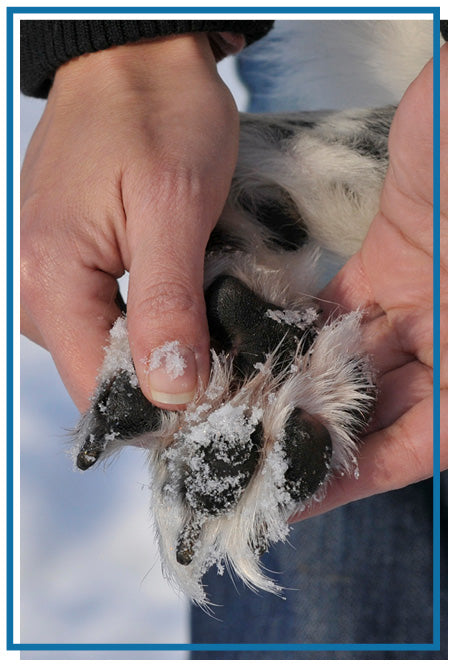
Frostbite
Ice and snow can be a real nuisance in the winter months, to both you and your dog. It can get caught on your pooch’s fur between their paws, which can cause discomfort, pain, and even frostbite in some cases.
If your dog is too cold, their body will restrict the amount of blood that flows to their paws, ears, tail, etc., in order to keep their vital organs warm. However, this can result in damage to your dog’s extremities instead.
Use paw protectors when walking your dog outside in the snow/ice and try to avoid letting your pooch tread on frosty surfaces. If your pup whines, stops walking, and regularly lifts up their paws, it may be because they’re too cold.
In addition, limit the amount of time your dog spends outside on extremely snowy, icy, or cool days.
If you suspect your dog has frostbite, book a vet appointment straight away. Common signs of this condition include black/dead skin, brittle/cold areas, discolouration or swelling of the affected area, and blisters.
Arthritis
Arthritis is the leading cause of severe pain in canines and is worsened in cold weather. It affects four out of five senior dogs in the UK, so if your pooch suffers from chronic joint issues, you need to take some extra steps to keep them comfortable in chilly conditions.
Avoid walking your dog early in the morning as this is when your pooch’s joints will be the stiffest and most inflexible. Wait until they’ve warmed up before you go for a walk, and avoid going outside in extreme weather.
***
Care During Walks
Regular exercise is important for your dog’s physical and mental health, even in the winter months. However, you may need to make some adjustments to your dog’s daily exercise routine and take some extra measures to keep them safe.
Avoid Walking On Frozen Lakes/Ponds
If you live near a frozen lake or pond, don’t let your dog step across it during a walk, and keep them on a leash around the area. Your dog could hurt themselves on rough ice, slip over, or fall through the ice if it breaks.
While frozen bodies of water can look solid at first glance, they often have holes or sections of thin ice that your pooch could fall through. Don’t follow your pooch into the lake/pond if they fall in as the ice will likely shatter under your weight.
Instead, use your dog’s leash or a long branch and encourage your pooch to swim towards you.
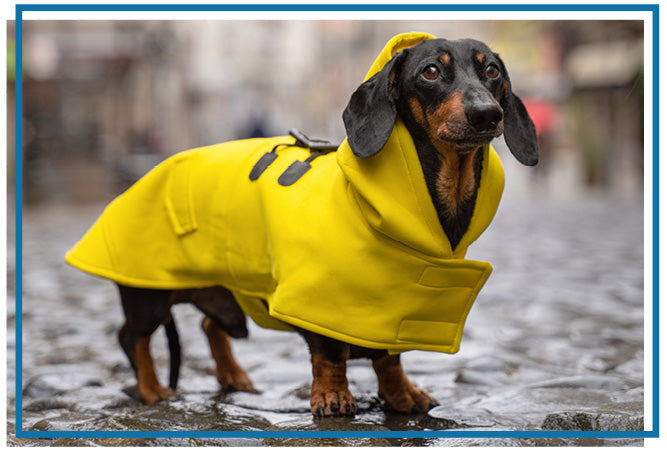
Use Paw Protectors and Dog Coats
As mentioned earlier, paw protectors and dog coats are helpful for keeping your pooch warm and protected in cold weather. They are especially beneficial for young, elderly, small, and thin dogs.
Make sure the coat fits your companion properly - it should be snug but not overly tight or loose.
Keep an Eye Out for Rat Poison
Rat/mouse poison can be dangerous in all seasons, but your dog is most at risk of coming into contact with it during the winter months as more people will put it down to ward off rodents.
These products contain ingredients that attract mice and rats, but they can also be enticing to other animals. If ingested, rat poison will prevent your dog’s blood from clotting properly and will cause bleeding.
It’s best to avoid using rodent poison altogether if you own a dog, but if you need to use it, place it in areas that are inaccessible to your pet.
Talk to your vet immediately if you believe your dog has ingested poison - the sooner you act, the better.
Keep Antifreeze Away From Your Dog
Antifreeze or car engine coolant isvery toxic to dogs as it can cause kidney damage and death, even in small quantities. The liquid has a sweet scent and taste, which your dog may find tempting to drink.
Keep the bottle far out of your dog’s reach such as inside a locked cupboard or on a high shelf and clean up any spills immediately. If your dog walks through the liquid or gets it on their body, give them a bath with soap straight away.
Contact your vet immediately if you think your dog has consumed antifreeze as they will need emergency treatment.
Work on Recall
Cold weather and dark evenings can be dangerous as your dog will be harder to spot, especially in foggy or snowy conditions. It’s a great idea to work on your pooch’s recall so you can keep your dog close to you when they’re exploring off the lead.
Increase Your Dog’s Visibility
If you’re walking early in the morning or late at night, it can be hard for drivers and other pedestrians to see you during the winter months. You should keep both you and your dog safe by wearing reflective clothing.
Flashing collars and leads can also increase your pooch’s visibility in the dark.
Stay Active Indoors
If the weather is extremely cold or snowy outside, you might want to skip walking your dog until conditions have improved. However, it’s still important to keep your dog active, so consider exercising them indoors.
Puzzle toys, tug-of-war, and fetch are some great ways for your dog to burn off steam inside.
Don’t Leave Your Dog in the Car Alone
Never leave your dog alone in the car, in both hot and cold weather. If the temperature in the car drops too low, your dog could become hypothermic. If you need to run errands, take your dog with you or leave them at home.
***
Grooming
Although frequent grooming is vital for your dog’s health and wellbeing in all weather, there are some extra things you need to do in cold conditions to keep your dog looking and feeling their best.
Cut the Fur Around Your Dog’s Paws
Snow, ice, and road grit can stick to the fur around your dog’s paws, which can lead to pain, discomfort, and swelling. It’s a good idea to trim the hair around your pooch’s feet and in between their toes to help keep their paws clean.
Check for Road Grit Between Your Dog’s Paws
While road grit and salt can make roads and pavements safer in icy weather, both can be harmful to your dog. Gritted surfaces can irritate your dog if it gets caught between their paws, resulting in soreness and cracked areas.
In addition, road grit often contains salt and other chemicals that can make your dog ill if they are ingested. Make sure you clean off grit between your dog’s paws once you get home or use paw protectors.
Use Balm On Sore or Itchy Skin
Cold weather can dry out your dog’s skin and result in itchiness and soreness, especially on their paws. Ice, snow, and road grit can also leave your dog’s skin painful, swollen, and scratchy.
Skin balms designed for dogs can soothe your companion’s skin and prevent it from becoming cracked, itchy, and sore. These products usually contain essential oils to help heal and repair damaged skin.
***
Diet
Dogs are often less active and energetic in cold weather, which can lead to weight gain if they take in more calories than they burn. You might need to reduce the amount you feed your pooch to prevent them from putting on weight.
Limit calorific treats and continue to take your dogs on daily walks if the weather isn’t overly cold. If outdoor conditions are too extreme, play games with your pooch and provide them with plenty of toys to keep them mentally and physically stimulated.
***
Supplements
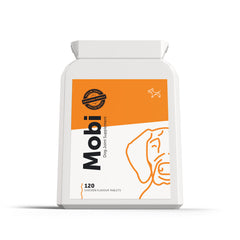
Joint issues and skin problems are often worse in cold weather, which can affect your dog’s well-being and their ability to function. Supplements targeted for alleviating symptoms of these types of conditions can be beneficial and improve your dog’s quality of life.
For instance, supplements containing glucosamine and chondroitin can work wonders for dogs suffering from arthritis or mobility issues by improving flexibility and overall joint health.
Our MOBI mobility support supplement contains both of these ingredients, alongside MSM, green-lipped mussel, and curcumin (turmeric). This combination helps reduce inflammation, decrease stiffness, support the formation of cartilage, and help your dog stay agile.
And as we know supplements can be a little unappetizing to dogs, MOBI comes in a delicious chicken flavour to make it easier for your pooch to eat.
MERIC EXTRA, our 100% turmeric extract supplement for dogs, pairs well with MOBI as it offers additional support to canines with joint issues.
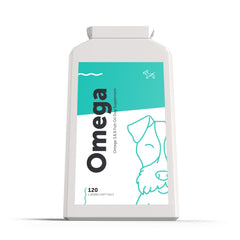
Alternatively, if your pooch has trouble with dry skin or allergies, supplements that contain omega fatty acids like OMEGA can relieve soreness, and itchiness, as well as enhance the appearance of their coat.
OMEGA is our 100% fish oil supplement that contains omega fatty acids like EPA, DHA, ALA, OA, and vitamin E to keep your dog’s coat healthy and their skin itch-free. It provides relief to allergies and skin issues, as well as improves heart, brain, and joint function.
As always, make sure you speak to your vet before you add supplements to your dog’s diet to ensure they’re a suitable option for your pooch.
***
Final Thoughts
The wintertime can be a frustrating and inconvenient few months for dog owners, especially as there are so many hazards that come along with cold weather. However, the right preventative measures can help you keep your pooch safe, comfortable, and warm throughout the cold season.
Remember, avoid walking your dog in extreme weather and make sure they’re fitted out with reflective, thermal clothing like paw protectors and a coat. Steer clear of frozen lakes, icy paths, and recently gritted surfaces.
Keep antifreeze and rat poison out of your dog’s reach, and make a few adjustments to their feeding and grooming routine so they’re equipped for the chilly weather. Supplements, once approved by your vet, likeMOBI,MERIC, andOMEGA are also great for your pooch’s health during the cooler months.
Also in Pet Advice

Should You Add Water to Your Dog’s Kibble? Here’s What the Science Says
August 14, 2025 7 min read
Should you add water to your dog’s kibble? Discover the science-backed pros, cons, and better alternatives like bone broth and fresh food to improve hydration, digestion, and overall canine health...

DIY Frozen Dog Treats Your Pup Will Love
June 27, 2025 4 min read
Summer heat can be dangerous for dogs, making hydration more important than ever. Learn how to spot signs of dehydration, boost your pup’s water intake, and create fun, frozen recipes to keep them happy and healthy all season long.
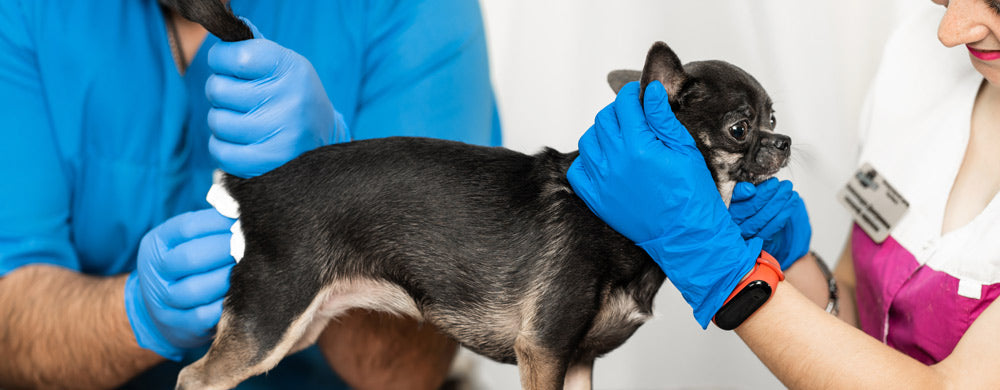
Why Is My Dog Scooting? Common Causes and How Diet Can Help
May 09, 2025 4 min read
If your dog is scooting or smells fishy, it could be due to blocked or irritated anal glands. Learn what causes blocked anal glands, which dogs are most at risk, and how simple dietary changes—like adding fibre and anti-inflammatory nutrients—can help prevent recurring problems.
Search our shop
In this article
